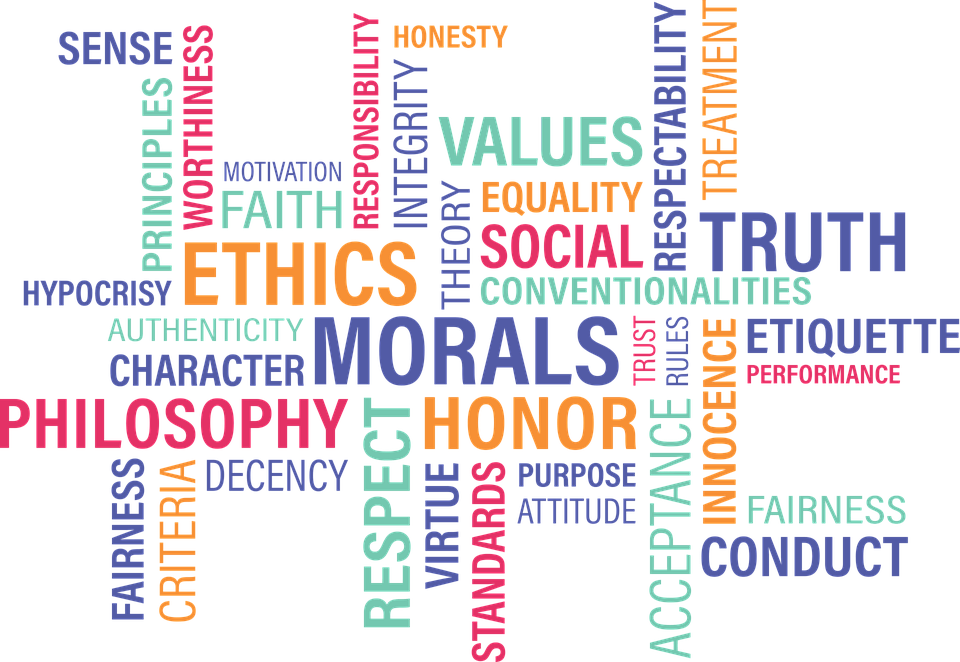Science and ethics: When do we cross the line

Science makes us believe that the impossible can become possible and everything can and should be attempted. All it takes is the usual "I wonder" scientific thoughts and a workable hypothesis and we are good to go on a ground breaking discovery.
The craziest of all the recent feats is a successful head surgery, being able to reconnect nerve endings and the potential applications of this knowledge. Of course we know that cloning is possible, but then what stops us from taking this public is called ethics.

It's all about ethics
Although I will require permission to use ethics and conscience interchangeably throughout the write up, thanks for granting that. Now let's be more practicable with something more relate-able in other to make your understand broader. We all know that a black belt holder in Taekwondo can beat a non martial artiste to a pulp with ease, but him doing so without provocation is so demeaning. That value attached is known as ethics.
Ethics gives us a line we must never cross and when that is crossed, we are better off classified as savages. In the science world, there are some things that are forbidden even for a liberal field.
Among the forbidden experiments in the science world are:
- Cloning
- Illegal body enhancement
- Organ harvesting on non willing donors
There are so many other examples out there of things that are considered illegal in the liberal science world. The reason why ethics exists even in the science realm is to separate the maniacs and sickos from the genuine and creative scientific minds.
Ethics are the norms and practices guiding a relevant field or way of life. Another critical example is that of a male gynecologist who has access to the female private part on a day to day basis, personally he might feel like misbehaving, but ethics stops him from trying anything funny.
Sometimes, even science crosses a line with the rules obviously kicking against it. The first law of robotics is simpler words states that a robot might not directly cause harm to a human or through it's inaction allow harm to come to it. But yet we know about constant research to get the first war ready robots ready just in case of a war.
Another thing why science forbids robots from doing specific tasks is because it is argues that a robot lacks ethics as a result of a deficiency of true human emotions, hence it cannot be compassionate.
We hear of cases where people say a child sex can be modified scientifically before birth or certain key features can be adjusted and we wonder, are children not supposed to be gifts unto us?
Adjusting key features like maybe genetically manipulating sickle cell is not what I am referring to here, I am referencing to manipulating eye color because the parents "prefer" a certain eye color which sometimes, they may not even have, we wonder if this science should not focus on deeper things like sickness free babies, sickness resistant babies etc rather than eye color. Choices which even gives the baby a chance to have a say, not be bent to a form where the parents live their dreams in the unborn child.
We know when organs are harvested and sold from a living donor (who probably still needs it), it is sometimes sold to other individuals with urgent requirement for it. But here is how ethics plays in, taking organs out of a living and unwilling host is illegal even though the intended recipient is in dire need of it.
The practice or principle of ethics greatly relies on consent in most areas. A doctor could perform a last minute life saving surgery on a dying and unconscious patient, but the same patient might sue the doctor once the patient regains full consciousness due to lack of expressive consent.
In the same vein, a lady can sue you for rape even when she gave initial verbal confirmation for sex. How you may ask? Well if she tells you to stop right about when you are about to ejaculate and says she is no longer interested, you have to stop (even though it becomes almost impossible) because even one further thrust is considered rape.
References
https://www.theguardian.com/lifeandstyle/2010/apr/03/sex-selection-babies
http://indiatoday.intoday.in/story/sex-change-drugs-thrive-in-haryana/1/471840.html
https://www.theguardian.com/sustainable-business/2015/nov/03/designer-baby-pgd-would-you-edit-your-unborn-child-genes-more-successful
You can follow me on twitter by clicking the icon
Thanks to @camzy/ @samstickkz and @elyaque for the animated art and badge
Support @curie, @ausbitbank, @teamsteem, @xeldal, @steemgigs for witness
You can help me boost my curation activities by following my curation trail on steemauto.com ( @ehiboss)
Images from pixabay




There is a thin line between ethics and innovation in health. But most of the time I do not really think the clamour for ethics should apply in some of medical advancement. But organ harvesting on unwilling donors is pure criminal enterprise. Keep blazing. Keep steeming
Informed consent is an important part of ethics (in medicine, research, and life). For a lot of other things I think every generation looks back at the previous in medicine and says, "I can't believe we used to do that".
I swear, this was informative and funny, especially the last part
Do not resuscitate (DNR) is real. Try to resuscitate a patient with it and be successful and open yourself to being sued. On the sex part, no means no, you just gotta stop if she says stop 💯
@datascience, you are very right. I agree with your point of view. Thanks.
What a last paragraph (!)
good post..
Totally agree. Although I don't know what to say about the last paragraph.
We need to have morality in the use of science. So that people can use it well.
A fine line does indeed exist between science and ethics. Not crossing the line is what keeps our humanity intact and prevents us from selling our souls. We know this because in past times scientists have done the unthinkable all in the name of performing "research" to enhance scientific and technological advancement. Thanks for bringing this to light.
Hi @ehiboss, I must commend your writing skill. It's never boring on your blog. Though I'm no the type that reads between lengthy words but I found it difficult to scan through your post but to read every single word.
"In the same vein, a lady can sue you for rape even when she gave initial verbal confirmation for sex. How you may ask? Well if she tells you to stop right about when you are about to ejaculate and says she is no longer interested, you have to stop (even though it becomes almost impossible) because even one further thrust is considered rape".
At every scientific instances you gave above where ethics apply I agree with them but for the one I italized I have a slight concern about it.
I think ethics apply between the time of making the move through the foreplay before both of them get into action. If the woman directly refuse him from ejaculating may also be termed unethical because she shouldn't engage him in the first place much less of giving a verbal confirmation of go ahead. That may as well traumatize the man.
Here, the question is whether it is ethical to traumatize a man or to hurt her feeling of medicine after death? But I think one of high severity than the other which requires giving preference. This is my take.
@bob-elr
Nice. Thanks @ehiboss
I'm now following you
Ethical information regarding about the
The unresolved conundrum is about the ethics of using the data generated by Nazi doctors during WWII. They had uncontrolled access to the human beings, and the medical experiments were nothing but another form of torture and murder which is extremely unethical. But they also pose an uncomfortable moral challenge: what if some of the medical experiments yielded scientifically sound data that could be put to good use? For example: US researchers in late 1980s argued the Nazi hypothermia data was critical to improving methods of reviving people rescued from freezing water after boat accidents. Would it be justifiable to use that knowledge? Ethical or pragmatic? Thats when a thin line separates humans from becoming monsters.
this is the real fact @ehiboss, the last paragraph of your post is usually common among most nigerian ladies where they attempt to force themselves on men , when he refuses she will be the one to scream out to the public..
even our legal system backed some of it up which is very wrong..
this is nice coming from you
You really touched an area where professionals and individuals have to be really careful not to fall into a ditch. Ethics, consent, euthanasia,abortion, rape have all heated debate over the years. Thanks for sharing.